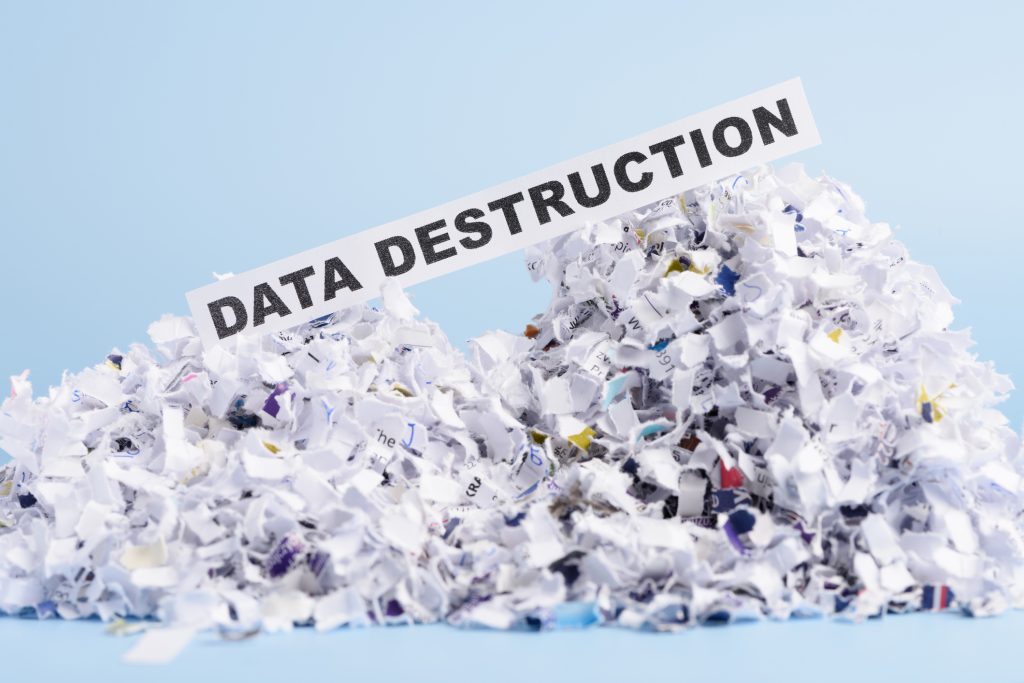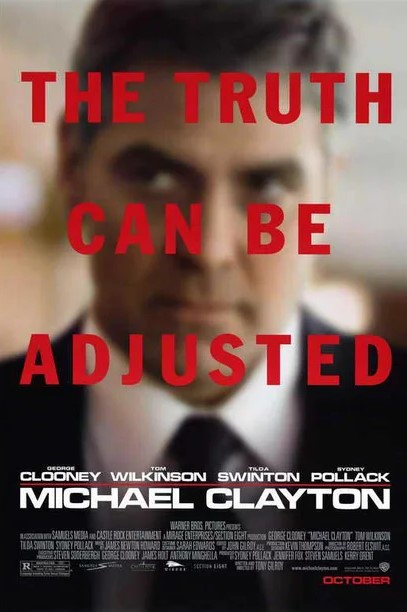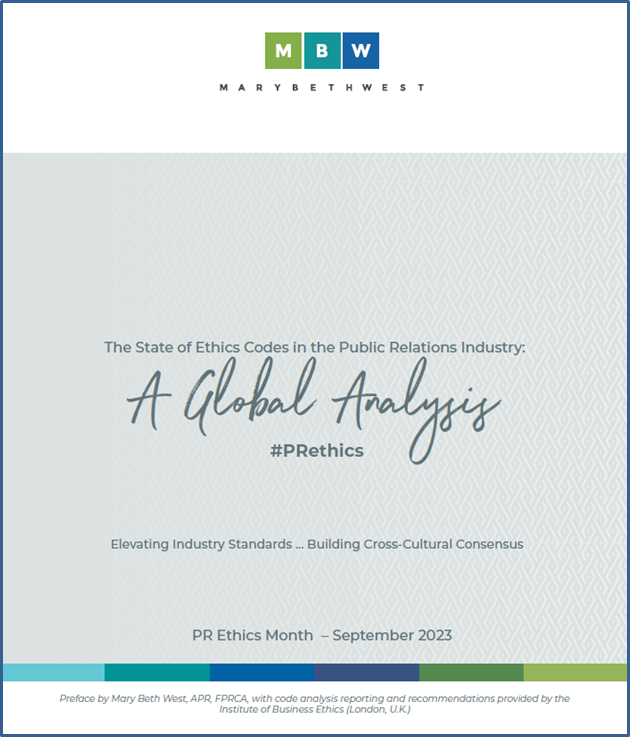The #PRethics of Being Asked to Destroy Evidence
In the public relations field, it’s important to remember that PR practitioners are often on the front lines of having access to a company’s critical and proprietary information.
In a compromised scenario, however, such information may be highly controversial or, in a worst-case scenario, incriminating.
In such cases, the PR professional needs to begin asking critical questions and exercising care not to make a misstep, for which they themselves can be held liable.
It can be a dangerous position, if not handled correctly… particularly if we’re placed in the untenable posture of not being told to manage information ethically — but, instead, to destroy it illegally.

Such an unsettling directive from management can be a clear, potential “smoking gun” of premeditated or at least self-acknowledged wrongdoing… about which a PR practitioner may otherwise be completely in the dark and unaware.
It’s equally important, however, to avoid making a snap-judgment about guilt or innocence of anyone, by investing the time to ask questions and get credible answers, before firing up the deskside shredder.
Let’s look at a purely fictional case, to illustrate some important points.
One of my favorite films of the past 20 years starred George Clooney, in the drama, “Michael Clayton.”

The story unfolds of anti-hero Michael Clayton, played by Clooney, who is the unofficially titled “fixer” at one of the most high-powered law firms in the world.
By job function, the role of “fixer” means that Michael serves as a meticulously skilled, deep-Rolodex-wielding janitorial service (metaphorically speaking) for his colleagues’ clients in the law firm and their legally / ethically disastrous missteps that need to be concealed from public view… and any potential view of a jury, later.
In short, Michael’s job is to make inconvenient legal and/or PR problems go away.
As such, working fully behind-the-scenes, Michael is the “fix-it” guy for the embarrassing and potentially catastrophic crises of the law firm’s clients… like a super-rich CEO who’s just committed a vehicular hit-and-run in the middle of the night and feels hyper-entitled to a quick get-out-of-jail-free card.
However, as good as Michael is at his job, he also possesses the practical backbone to know when to set a client straight…
But then, everything changes.
Michael’s long-time, intellectually brilliant (yet mental-health-volatile) mentor in the law firm, Arthur Edens (played with stunningly effect by Tom Wilkinson), suffers an epic, psychotic breakdown, right in the middle of a high-stakes deposition for an ethically rotten but wildly lucrative client, for which Arthur has been investing years leading a class-action, multi-billion-dollar lawsuit.
The law firm’s senior partners and Michael have known that Arthur takes antipsychotic medication and has been doing so for years… which is a medical condition they’re normally satisfied to overlook as long as Arthur’s off-the-chart genius in a court room and in capturing mega-millions in billable hours remain consistent.
But then, a bigger problem:
Arthur finds a decades-old, internal lab-research memorandum that his client squirreled away, rife with utterly damning clinical confirmation that the client’s products have verifiably killed countless people, which the client has kept well-hidden (or so they thought).
The realization makes Arthur come undone further in his own existential crisis… since he has spent years defending a client that’s guilty beyond his wildest imagination — to a point that even he can’t reconcile it with his own morality.
When Michael confronts Arthur in a New York alley to beg him to come to his senses after the psychotic episode by taking his mental-health meds and getting back on track defending the evil client (Michael is wholly unaware just how evil), Michael pleads to Arthur, “I’m not the enemy“…
…To which Arthur coolly retorts to his protégé – with his own sense of moral centeredness amid madness…
“Then who are you?”
The house of cards begins its slow-motion collapse.
The evil client’s in-house counsel (played brilliantly by Tilda Swinton, earning her an Oscar) ultimately hires hit-men to deal with Arthur “the other way“… her euphemism for murdering him in his apartment before he can reveal the truth of his own client’s corruption – making the death look like a suicide.
One of the most chilling scenes is when the Swinton character calmly calls the hit men initially – sight-unseen – from her hotel room, to set plans in motion for stalking Arthur, gingerly holding the phone receiver and the incriminating memorandum in her hands covered in plastic, in order to keep her fingerprints undetectable.
Michael finally realizes Arthur’s death was no suicide after Michael discovers the damning memorandum document, which Arthur previously had delivered to a print shop to have thousands of spiral-bound copies made to distribute to the world in full-on whistleblower mode, just prior to his being murdered.
Excellent drama with world-class scriptwriting further ensues.
In my long public relations career, I myself had never encountered a request made to anyone to destroy what might be perceived as potential evidentiary documentation, until suddenly, one day, I became knowledgeable of such a request (though not by a client or employer, thank goodness).
In a subsequent online search for guidance about what on earth a PR person should do next in the wake of this disturbing request, I stumbled upon this insightful blog by New York attorney, Adam J. Langino, Esq., which also invoked the film “Michael Clayton,” to serendipitous effect – reminding me how much I loved the film and also reminding me that courage in the face of misguided power is a virtue, though it’s often not rewarded, but punished (not everything can be like the movies).
Incidentally, the legal term “spoliation” is now a new vocabulary word in my mental dictionary – proving it’s never too late to learn new things.
It’s interesting when the PR world collides with the legal world.
All-too-often, PR practitioners do not have the training or know-how to navigate a situation fraught with threats of lawsuits or even a potential specter of noncompliant or illegal activity. No one who is well-meaning ever wants to get caught up in that kind of thing.
However, any factory-default setting in a PR person’s brain to follow instructions blindly from their ethically / legally compromised management (or management’s legal counsel) — many of whom can be quite intimidating because it’s what they do for a living – can have their own dire consequences.
In my recent white paper on the state of global PR ethics codes, the researchers I commissioned for the study found that PR associations’ ethics code provisions rarely treat the specifics of handling sensitive data… particularly digital data.

In my view, it’s a gaping hole (among many) in the lexicon of PR industry treatment of ethics issues.
We need more robust resources and guidance… in this case, about the Do’s and Don’ts of things like document-destruction and document-retention policies, as well as legal parameters.
If a client or supervisor or organization that you serve in any capacity asks you to destroy documents, digital files, videos, audio-recordings, etc., you’d better know exactly why they’re asking you to do it and whether that reason has any foundation in legal and regulatory compliance.
It needs to pass more than just “the smell test.”
Translated: it better not be illegal… because you WILL be left holding the bag later as a defendant or as an accused accomplice of a defendant, if it is illegal and later brought forward to a trial.
Bear in mind that – in the United States, anyway – it can be a federal crime to destroy documents that later come to pass… even if way down the timeline… to have been vital evidence in a legal case.
In matters of truth, transparency, and compliance, it’s always just as important to follow one’s good instincts of the right thing to do as it is to follow the law – regardless of what jurisdiction you find yourself in… made more complicated, of course, if you find yourself being pulled between the potentially differing laws of two separate geographic domains (different U.S. states have their own laws) or even nations.
###
“The last place you want to see me is in court.” – Arthur Edens, “Michael Clayton”

[…] Destroying written evidence of clear procedural mistakes or wrongdoing isn’t the answer. […]